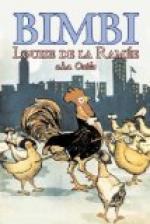“Dear simple one, she knows nothing of it,” said Luca, heaving another tremendous sigh from his heart’s deepest depths. “You must know that a new order has come in this very forenoon from the duke; he wishes a dish and a jar of the very finest and firmest majolica to be painted with the story of Esther, and made ready in three months from this date, to then go as his gifts to his cousins of Gonzaga. He has ordered that no cost be spared in the work, but that the painting thereof be of the best that can be produced, and the prize he will give is fifty scudi. Now, Maestro Benedetto, having known some time, it seems, of this order, has had made in readiness several large oval dishes and beautiful big-bellied jars: he gives one of each to each of his pupils,—to myself, to Berengario, to Tito, and Zenone. The master is sorely distraught that his eyesight permits him not himself to execute the duke’s commands; but it is no secret that should one of us be so fortunate as to win the duke’s approbation, the painter who does so shall become his partner here and shall have the hand of Pacifica. Some say that he has only put forth this promise as a stimulus to get the best work done of which his bottega is capable; but I know Maestro Benedetto too well to deem him guilty of any such evasion. What he has said, he will carry out; if the vase and the dish win the duke’s praise, they will also win Pacifica. Now you see, ’Faello mine, why I am so bitterly sad of heart, for I am a good craftsman enough at the wheel and the furnace, and I like not ill the handling and the moulding of the clay, but at the painting of the clay I am but a tyro, and Berengario or even the little Zenone will beat me; of that I am sure.”
Raffaelle heard all this in silence, leaning his elbows on his friend’s knee, and his chin on the palms of his own hands. He knew that the other pupils were better painters by far than his Luca, though not one of them was such a good-hearted or noble-looking youth, and for none of them did the maiden Pacifica care.
“How long a time is given for the jar and the dish to be ready?” he asked, at length.
“Three months, my dear,” said Luca, with a sigh sadder than ever. “But if it were three years, what difference would it make? You cannot cudgel the divine grace of art into a man with blows as you cudgel speed into a mule, and I shall be a dolt at the end of the time as I am now. What said your good father to me but yesternight?—and he is good to me and does not despise me. He said: ’Luca, my son, it is of no more avail for you to sigh for Pacifica than for the moon. Were she mine I would give her to you, for you have a heart of gold, but Signor Benedetto will not; for never, I fear me, will you be able to decorate anything more than an apothecary’s mortar or a barber’s basin. If I hurt you, take it not ill; I mean kindness, and were I a stalwart youth like you I would go try my fortunes in the Free Companies in France or Spain, or down in Rome, for you are made for a soldier.’ That was the best even your father could say for me, ’Faello.”




